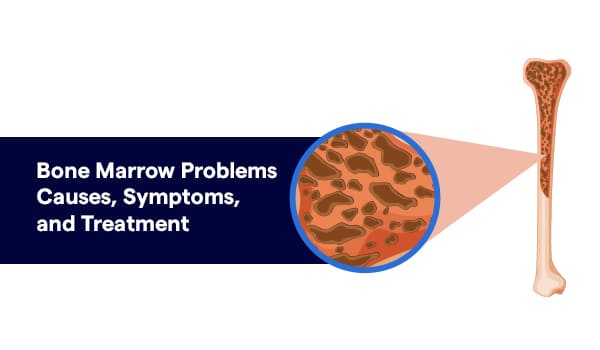
Several conditions can affect the bone marrow's ability to produce healthy blood cells. Cancer, specifically Leukemia and Lymphoma, can have an impact on the bone marrow's ability to produce healthy blood cells. Genetic problems like sickle cell anemia, thalassemia, and Fanconi anemia can also influence the bone marrow's ability to produce healthy blood cells. Exposure to toxins like benzene, radiation, and chemotherapy can damage the bone marrow, leading to bone marrow problems. Lastly, Autoimmune disorders like Lupus and Rheumatoid arthritis cause the immune system to attack the bone marrow, resulting in bone marrow problems.
Bone marrow problems can have varying symptoms depending on the type and severity of the condition. The most common symptoms of Bone marrow problems include fatigue, weakness, and dizziness caused by a lack of healthy blood cells. Additionally, a lack of healthy white blood cells can increase the risk of infections, while a lack of healthy platelets can cause easy bruising and bleeding. Anemia also occurs due to a lack of healthy red blood cells, resulting in shortness of breath, weakness, and fatigue. If you experience any of these symptoms, it is important to consult a medical professional for proper diagnosis and treatment.
Treatment Options for Bone Marrow Problems
The bone marrow transplant process involves multiple stages. Initially, the patient undergoes high-dosage chemotherapy and/or radiation therapy to eliminate the damaged bone marrow. However, the procedure comes with risks and complications, including graft-versus-host disease (GVHD), where the transplanted cells attack the patient's tissues and infections due to the weakened immune system.
Bone marrow transplant is a medical procedure involving the infusion of healthy stem cells into the patient's bloodstream. These cells then travel to the bone marrow & produce new blood cells. However, before the transplant can take place, several steps are involved.
Firstly, the patient undergoes a pre-transplant evaluation to assess their overall health and determine their eligibility for a bone marrow transplant. This evaluation may include blood tests, imaging studies, and other medical assessments.
Next, the stem cells for transplantation are obtained through harvesting. These healthy stem cells can come from the patient themselves, a compatible donor, or umbilical cord blood.
Before the bone marrow transplant, the patient may undergo a conditioning regimen, which involves high-dose chemotherapy and/or radiation therapy. This is done to destroy cancer cells or suppress the immune system to prevent rejection of the donor cells.
Finally, the stem cells are infused into the patient's bloodstream through a catheter, similar to a blood transfusion. The cells then travel to the bone marrow, where they can begin to grow and produce new blood cells.
Types of Bone Marrow Transplant
There are 3 main types of bone marrow transplant, each with its advantages and considerations:
The recovery process involves different aspects, including engraftment, monitoring, immunosuppression, and long-term follow-up. During recovery, the patient will be closely monitored for signs of infection, graft rejection, or other complications. Blood tests and other assessments may be done regularly to track the progress of engraftment and overall recovery. In the case of an allogeneic transplant, the patient may need to take immunosuppressive medications to prevent graft-versus-host disease and help the donor cells integrate successfully. Following the initial recovery period, the patient will require long-term follow-up care to monitor for any late effects of the transplant, such as secondary cancers or organ damage. Regular check-ups and screenings from the best orthopedic hospital are essential for maintaining the patient's health and well-being.
Sir Ganga Ram Hospital offers state-of-the-art bone marrow testing services to diagnose and treat bone marrow problems with world-class doctors and infrastructure.
Book an appointment with us and get started on your journey towards better health and hope.